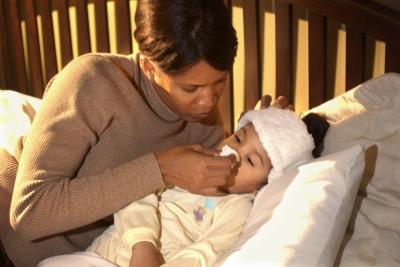Nosebleeds occur for a variety of reasons during the childhood years. Because the blood vessels are so close to surface inside the nose, bleeding can easily occur. Colds and allergies sometimes cause nosebleeds because the vessels are enlarged. An injury to the nose is another common childhood source of nosebleeds. Seeing blood gush from your child’s nose often causes alarm. Many nosebleeds are treatable at home, but more severe bleeding might warrant a trip to the doctor.
Step 1
Ask your toddler to spit or rinse out his mouth if any blood traveled down into it.
Step 2
Hold your child in your lap or place her on a secure chair and ask her to lean forward. A slight lean forward is the best position to help stop the blood flow. Leaning backward causes the blood to run down the throat, which could cause gagging or vomiting.
Step 3
Hold a clean washcloth over your child’s nose to catch the blood. Squeeze the soft part of the nose gently. Encourage your child to breathe through his mouth during this process.
Step 4
Maintain the gentle pinching for 10 minutes, even if the bleeding seems to stop. Soothe your child with singing or a quiet toy to keep her calm and still for the full 10 minutes.
Step 5
Remove the washcloth to assess the bleeding after the 10 minutes elapses. If the bleeding continues, resume the washcloth and pinching treatment for an additional 10 minutes. Hold the pressure for the additional 10 minutes without releasing to check for bleeding.
Step 6
Apply a cold compress to the bridge of the nose in addition to the pressure for additional help in stopping the bleeding. Remove the compress and washcloth after the second period of 10 minutes to check for bleeding.
Step 7
Call your child’s physician or go to an urgent care clinic if the bleeding doesn’t stop after 20 minutes. Other reasons to call or visit the doctor include breathing difficulty, sweating, pale or sickly appearance, other bleeding or unusual bruising on other areas of the body. Head trauma, something lodged in the nose or suspicions of a broken nose should receive medical attention immediately.





